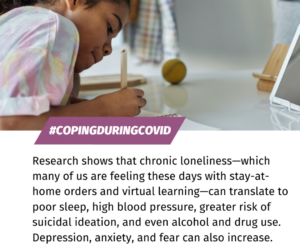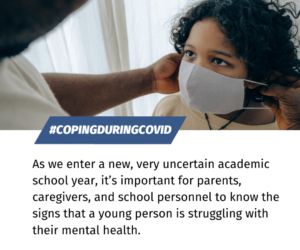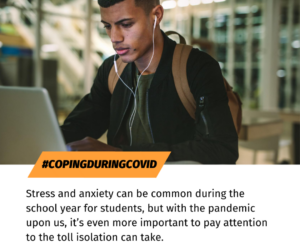The COVID-19 pandemic continues to exact a huge toll on not just the physical health but the mental health of the nation. As we enter a new, very uncertain academic school year – it’s important for parents, caregivers, and school personnel to know the signs that a young person is struggling with his or her mental health.
Loneliness and isolation can negatively impact a child’s mental health
We know that stress and anxiety can be common during the school year for students, but with the pandemic upon us, it’s even more important to pay attention. For those who are physically going back to schools, the anxiety and fear are palpable – and simply navigating the uncertainly can feel overwhelming. And for those who are learning virtually, too much isolation can be harmful.
Research shows that chronic loneliness, which many of us are feeling these days with stay-at-home orders – can translate to poor sleep, high blood pressure, greater risk of suicidal ideation, and even alcohol and drug use. Depression and anxiety have also increased in the months since the pandemic began.
Half of all mental health disorders begin by the age of 14, and about 75 percent begin by the age of 24. But it’s also important to know that mental health issues are common and treatable – you don’t have to suffer in silence!
Take a mental health screening B4Stage4
 Know the signs and symptoms of mental health issues so that you can seek help for you or someone you care about. Free, confidential, and anonymous screening tools are available at mentalhealthmn.org/work/screening/ to check in on symptoms and to find resources to help.
Know the signs and symptoms of mental health issues so that you can seek help for you or someone you care about. Free, confidential, and anonymous screening tools are available at mentalhealthmn.org/work/screening/ to check in on symptoms and to find resources to help.
Just like physical health, taking care of mental health struggles early can help to prevent more serious problems from developing in the future. If you are concerned that you or someone you know may be experiencing a mental health problem, it is important to act before Stage 4. Start the conversation. Seek help from a trusted adult. Remember there is nothing to be ashamed of and that there is help and hope available.
Mental health crisis services and other support resources are available

We’re also providing free professional mental health support through our COVID Cares service by calling toll-free 833-HERE4MN. We are here to help anyone who is feeling elevated levels of stress, anxiety or depression during these unprecedented times.
In addition, to continually support people during the pandemic, we’ve temporarily extended our hours of our Warmline service from 12 p.m. to 10 p.m., Monday – Saturday. Our normal hours were 5 p.m. – 10 p.m. Our Warmline is staffed by certified peer specialists who know what living with a mental health condition is like.
Back to School 2020 Toolkit
Parents, students, and families
Teachers
- Dealing with Potential Exposure-The Stress of Physically Reopening Schools-Tips for Success
- Teachers-Protecting Your Mental Health-Ways to Help Other Teachers
- Teachers-Protecting Your Mental Health-Ways to Help Yourself
- For Teachers-The Stress of Reopening Schools